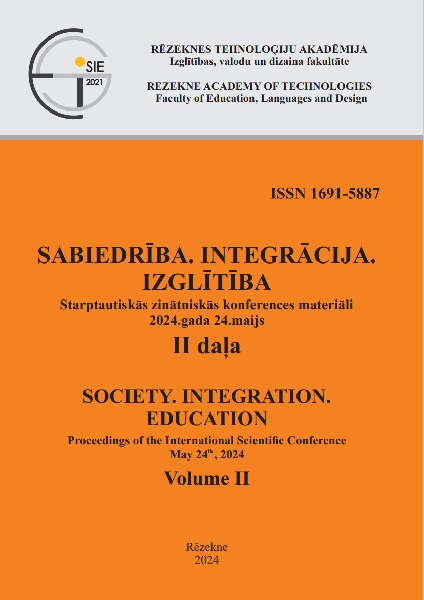ACTUALIZATION OF DZIGORO KANO'S JUDO PHILOSOPHY FOR VIRTUE EDUCATION IN PRESCHOOL CHILDREN
DOI:
https://doi.org/10.17770/sie2024vol2.7825Keywords:
friendship, judo, honesty, morality, respect, self-discipline, virtuesAbstract
The purpose of the article: in a theoretical analysis, to substantiate the usefulness of judo martial arts philosophy in the upbringing of virtues of preschool children (5-6 years old) in judo physical activities. The article examines the historical and cultural path of judo and its philosophical aspect in the education of moral qualities following the rules and self-control, managing emotions through regulators. The problem and actuality in the 21st century is the growing aggressiveness, cruelty and emotional indifference of children revealed in sports lessons. During the discussions, it was found that children do not know what virtues are. The work of sports teachers revealed that it is possible to use the principles of judo philosophy to promote the virtues defined in regulatory documents. The conducted research revealed that Judo philosophy is useful for realizing children's intellectual potential, promoting socio-emotional development, cultivating the virtues of honesty, mutual help, respect, friendship, kindness and courage in physical activities with Judo exercises. The disciplined exercises embodied in the Judo philosophy can help promote self-discipline, self-control and endurance.
References
Adriana, N., & Mircea, I. E. (2011). The Emotional Education Of Preschoolers Through Judo. Annals of the University Dunarea de Jos of Galati: Fascicle XV: Physical Education & Sport Management, (1).
Bennett, A., & Kanō Sensei Biographic Editorial Committee. (2009). Jigoro Kano and the Kodokan: An innovative response to modernisation. (No Title).
Bliznevsky, A. A., Kudryavtsev, M. D., Iermakov, S. S., & Jagiełło, W. (2016). Formation of active-effective attitude of 12-13 years' judo athletes to sports functioning in competition period. Archives of budo, 12, 136-145.
Adriana, N., & Mircea, I. E. (2011). The Emotional Education Of Preschoolers Through Judo. Annals of the University Dunarea de Jos of Galati: Fascicle XV: Physical Education & Sport Management, (1). Retrieved from: https://openurl.ebsco.com/EPDB%3Agcd%3A10%3A1013450/detailv2?sid=ebsco%3Aplink%3Ascholar&id=ebsco%3Agcd%3A87050172&crl=c
Bennett, A., & Kanō Sensei Biographic Editorial Committee. (2009). Jigoro Kano and the Kodokan: An innovative response to modernisation. Japan. Kanō Risei, Kōdōkan Judo Institute. Retrieved from: https://www.martialjournal.com/book-review-jigoro-kano-and-the-kodokan-an-innovative-response-to-modernisation/
Bliznevsky, A. A., Kudryavtsev, M. D., Iermakov, S. S., & Jagiełło, W. (2016). Formation of active-effective attitude of 12-13 years' judo athletes to sports functioning in competition period. Archives of budo, 12, 136-145.
Callan, M., & Bradic, S. (2018). Critical Judo Elements in Self-Control Development and Emotional Control. Applicable Research in Judo. Croatia. University of Zagreb. Retrieved from: https://uhra.herts.ac.uk/bitstream/handle/2299/24518/SELF_ CONTROL_paper_for_Porec_MC_authors_manuscript.pdf?sequence=1&isAllowed=y
Cohen, D., & Strayer, J. (1996). Empathy in conduct-disordered and comparison youth. Developmental psychology, 32(6), 988.
Decety, J., & Ickes, W. (Eds.). (2011). The social neuroscience of empathy. Mit Press. Retrieved from: https://mitpress.mit.edu/9780262293365/the-social-neuroscience-of-empathy/
Espartero, J., Villamón, M., & Gonzalez, R. (2011). Japanese martial arts: body practices that represent their cultural identity. Movimento, 17(3), 39-55.
Hoare, S. (2009). A history of Judo. London. Yamagi Books. Retrieved from: https://www.martialjournal.com/book-review-a-history-of-judo/
Hummel, T. H. (2022). Chancen digitaler Medien in der Elternzusammenarbeit. S.25. Retrieved from: https://opus4.kobv.de/opus4-ash/frontdoor/index/index/docId/482
IJF Statutes. (2017). Swiss Association. Translated from the French original. Retrieved from: https://www.ijf.org/documents
Kano, J. (1932). The contribution of Jiudo to education. The Journal of Health and Physical Education, 3(9), 37-58.
Kano, J., & Murata, N. (2005). Mind over muscle: Writings from the founder of judo. Revista de Artes Marciales Asiáticas, 1(3-2006), 89.
Kano, J. (1917). Dignity of the Judo Practitioner. Judo, 3(11). Pieejams: http://kodokanjudoinstitute.org/en/courtesy/grace/
Kiopa, M. (03/12/2015). Tikumiskā audzināšana ir cilvēka morā lā spēka attīstīšana. Pieejams: https://asociacijagimene.lv/asoc-prof-m-kiope-tikumiska-audzinasana-ir-cilveka-morala-speka-attistisana/
Judo, K. (2016). The Martial Art of the "Gentle Way" From old Japan to the modern world. Lexington: Nunoi Tatsuo. Retrieved from: https://uhra.herts.ac.uk/bitstream/handle/2299/24518/SELF_CONTROL_paper_for_Porec_MC_authors_manuscript.pdf?sequence=1
Kuehn, J. T. (2014). A military history of Japan: from the age of the Samurai to the 21st century. Bloomsbury Publishing USA. Retrieved from: https://www.abebooks.com/9781440803932/Military-History-Japan-Age-Samurai-1440803935/plp
Lasmane, S. (Atjaunots 2024. gada 21. februārī). Ētika - filozofiska morāles un tikumu teorija. Nacionālā enciklopēdija. Pieejams: https://enciklopedija.lv/skirklis/66472-%C4%93tika
Matsumoto, D. (1996). An introduction to Kodokan judo: history and philosophy. Tokyo, Hon-No-Tomosha. Retrieved from: https://www.abebooks.com/9784894390423/Introduction-Kodokan-Judo-History-Philosophy-4894390426/plp
MK. (2018). Ministru kabineta noteikumi Nr. 716. Pieejams: https://likumi.lv/ta/id/303371
Murata, N. (2008). Transitions within Kodokan Judo Etiquette. In International Budo Symposium (pp. 60-4).
Samardžić, D. (2011). Komparativna analiza visokoškolskog obrazovanja odabranih razvijenih zemalja svijeta (Doctoral dissertation, Josip Juraj Strossmayer University of Osijek. Faculty of Humanities and Social Sciences. Department of Pedagogy). Retrieved from:
Sánchez-García, R. (2016). The development of Kano’s judo within Japanese civilizing/ decivilizing processes. Asia Pacific Journal of Sport and Social Science, 5(2), 108-119.
Stevens, J. (2013). The way of Judo: A portrait of Jigoro Kano and his students. Shambhala Publications. Retrieved from: https://www.amazon.com/Way-Judo-Portrait-Jigoro-Students/dp/1590309162
Supinski, J., Obminski, Z., Kubacki, R., Kosa, J., & Moska, W. (2014). Usefulness of the psychomotor tests for distinguishing the skill levels among older and younger judo athletes. Archives of Budo, 10.
Špona, A. (2001). Audzināšanas teorija un prakse. Rīga: Raka.
Špona, A. (2022). Pedagoģija, Pārdomas. Atziņas. Rīga: Raka.
Takšić, V. (2003). Skala emocionalne regulacije i kontrole (ERIK): provjera faktorske strukture. Psihologijske teme, 12(1), 43-54.
VISC. (2019). Pirmsskolas mācību programma. Skola 2030. Pieejams: https://www.skola2030.lv/lv/istenosana/izglitibas-pakapes/pirmsskola
Watson, B. N. (2012). The father of judo: A biography of Jigoro Kano. Trafford Publishing. Kodansha Amer Inc. Retrieved from: https://books.google.lv/books/about/The_Father_of_Judo.html?id=cgsC5_k8UosC&redir_esc=y






